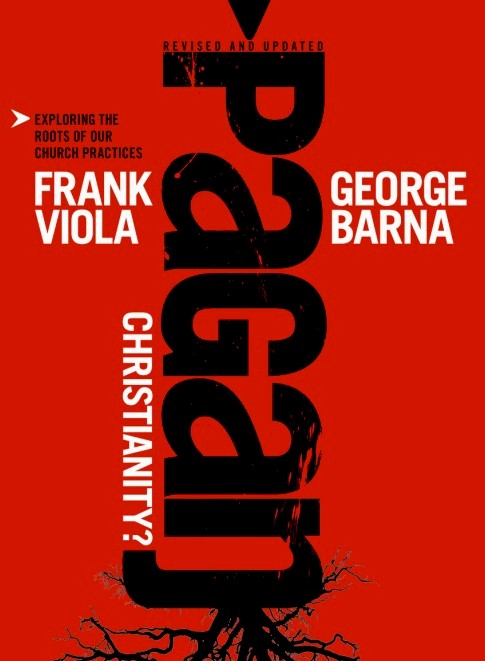
Edifice Complex!?!
Yup-o, you betcha.
The Church Building: Inheriting the Edifice Complex is the title of the second chapter of
Pagan Christianity?. Viola and Barna bring the reader through the
history and
mutations of the church building and its parts, claiming (of course) that these are rooted in pagan tradition. Here is a
brief summary of their case:
Ancient Judaism had this arrangement: Temple, priesthood, sacrifice.
When Jesus came, He ended all three, fulfilling them in Himself. He is the temple who embodies a new and living house made of living stones--'without hands.' He is the priest who has established a new priesthood. And He is the perfect and finished sacrifice. Consequently, the Temple, the professional priesthood, and the sacrifice of Judaism all passed away with the coming of Jesus Christ. Christ is the fulfillment and the reality of it all. (11)
Greco-Roman paganism had temples, priests, and sacrifices too. But in the New Testament, the church was not a building, but a group of Christians. Meetings were held in homes (not a temple building), led by every believer (not a special caste of priests), and only offered "spiritual sacrifices of praise and thanksgiving."(13) By the time Roman Catholicism was established, it continued practices associated with paganism and Judaism. When Protestants had their way, they "retained the priestly caste (the clergy) as well as the sacred building." (13)
I will spare you the graphic details, but here is the basic, early time line of church evolution according to PC?:
1st-3rd Century - house church
2nd -3rd Century - sacred spaces and sacred things, ceremonial representation of the Lord's supper
Constantine(!) builds church buildings (Christian temples) on sacred sites even though he is practically pagan; actually, that may explain why he did it
~rituals performed: for cleansing of the commoner to enter the building and so on
~congregants: a passive role
~clergy don sacred garb
~professional music, choirs
~note the equation: church building + culture = holy shrine
Church buildings mutated from basilicas to Byzantine domes, Romanesque 3 story buildings associated with Charlemagne, Gothic cathedrals, to protestant modifications based on these models, to mega-church complexes.
In each mutation, there is a philosophical (and/or psychological) framework for the structure and the associated decorations and floor plan. This is where they make their point. The location and design of church buildings and the placement of items within our church buildings shape the way we worship and, therefore, these factors shape our faith. Additionally, taking care of these buildings consumes too much of our time, energy, and rapidly depletes financial resources.
It is high time we Christians wake up to the fact that we are being neither biblical nor spiritual by supporting church buildings. And we are doing great damage to the message of the New Testament by calling man-made buildings 'churches.' If every Christian would never call a building a church again, this alone would create a revolution in our faith. (43)
In their 'delving deeper' section at the end of this chapter, Viola and Barna answer hypothetical questions raised by some anybody. One answer they give gets to the heart of their message...
Although Scripture never discusses the topic specifically, church buildings teach us a number of bad lessons that run contrary to New Testament principles. They limit the involvement of and fellowship between members. Often their grandeur distances people from God rather than reminding them that Christ indwells each believer. As Winston Churchill said: "First we shape our buildings. Thereafter, they shape us." This has definitely been the case with the church building. (44)
...in 5 key points:
(1) it is unbiblical to call a building a 'church,' 'the house of God,' 'the temple of God,' 'the sanctuary of the Lord,' and other similar terms;
(2) the architecture of the typical church building hinders the church from having open-participatory meetings;
(3) it is unscriptural to treat a building as though it were sacred;
(4) a typical church building should not be the site of all church meetings because the average building is not designed for face-to-face community; and
(5) it is a profound error to assume that all churches should own or rent buildings for their gatherings. (46)
How a church building affects one's faith requires introspection. In my experience, the building is more of a practical nuisance than spiritual hindrance. However, the two may not be mutually exclusive. In one church, more people met (for more hours) discussing the maintenance and special upkeep of the building and its pieces than would meet for any other purpose, with the possible exception of meeting to preserve the substantial endowment fund, though these were definitely not mutually exclusive issues.
What's your experience with church buildings? Have buildings shaped your faith? Do the lessons we learn from church buildings run contrary to the message of the New Testament?
Next time in this series: Sunday Mornings
In the meantime, stay tuned for related posts.
 Why do I practice New Testament style church? Big subject!
Why do I practice New Testament style church? Big subject!




